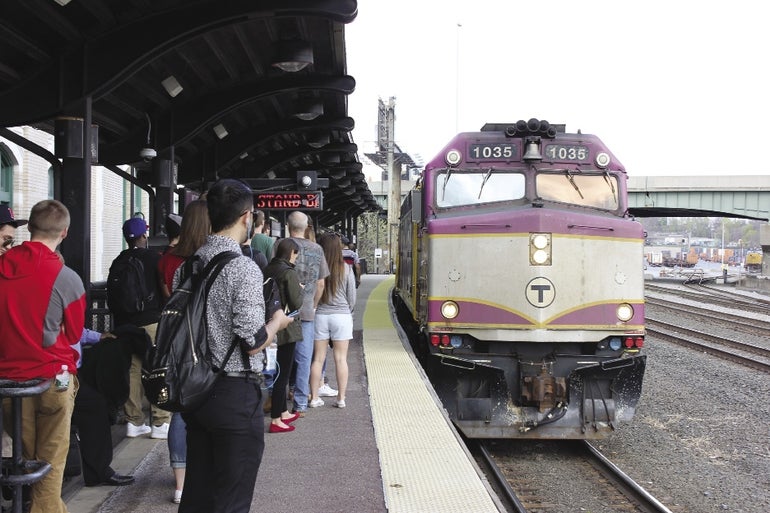Central Mass. wonders: What's in store for us amid potential T shakeup?
 PHOTO/SAM BONACCI
Boston-bound commuters wait to board a train at Union Station in Worcester on a recent afternoon.
PHOTO/SAM BONACCI
Boston-bound commuters wait to board a train at Union Station in Worcester on a recent afternoon.
The commuter woes of winter have had sweeping effects on the MBTA with the resignation of its general manager and six of the transit agency’s board members, and a push by Gov. Charlie Baker to restructure it in an effort to improve public transportation.
But Central Massachusetts communities are wondering whether these improvements will extend to the commuter rail lines that serve the region.
The lines are seen as a key to economic development in Fitchburg, Framingham and Worcester, with the additiions of apartments and services aimed at Boston-bound commuters around their rail stations, according to officials. All three communities are also pushing the T for shorter travel times to boost the number of commuters and encourage businesses to move out here.
“Increasingly, companies don’t want to have all of their operations in just one place,” Timothy Murray, president and CEO of the Worcester Regional Chamber of Commerce, said. “If we can be a lower-cost alternative, but very accessible, we could bring some of those financial services or state agencies into Worcester and Central Massachusetts.”
According to the MBTA, an average of 8,474 riders per day took the Worcester-Framingham line into Boston in 2013, while 7,819 made the reverse commute. And they have become a key economic driver in Central Massachusetts, said Michael Traynor, Worcester’s chief development officer.
The two lines have allowed communities such as Fitchburg, Framingham and Worcester to become viable options for those looking for more affordable homes or relaxed lifestyles while working in Boston, according to area officials.
Faster commutes?
“A predictable, reliable system becomes a system people can make life decisions around and that is of interest to us … as we look to incorporate transit-oriented development in our downtown,” said Arthur Robert, Framingham’s community and economic development director.
It takes about an hour and 15 minutes to get from Worcester to Boston by train. Worcester and Fitchburg officials would see that cut to an hour or less through the use of express trains. In Worcester, officials are asking for three of them during the weekday morning commute and another three for the afternoon return trip. That would be “another tool” to bring businesses and people to downtown, Traynor said.
Rail is equally important in Fitchburg, where $277 million in improvements to the line — which will speed up the trip to and from Boston — and the coming addition of Wachusett Station in west Fitchburg have already spawned commercial development in anticipation of more commuters, according to Larry Casassa, Fitchburg’s acting director of community development.
“People make decisions based on access,” he said. How long they’re going to sit on a train and whether they can get to work reliably will factor into “how far away (from Boston) they are willing to look” for a place to live. Cutting the T commute to an hour would make a difference, he said.
Additional trains for the westbound rail lines could come from among 40 new trains that are being added to the T’s fleet. Fourteen of those trains are active, with three to four being added each month across all 12 commuter lines, T spokesman Joe Pesaturo said. An additional 75 new double-decker coaches have also been added to the mix, boosting the number of passengers per trip. However, the T hasn’t determined whether express trains would be a part of the Worcester and Fitchburg mix. The T is reviewing the best options to improve “reliability and customer satisfaction,” according to Pesaturo.
“Any proposed schedule changes (as a result of this review) will be communicated with local officials and the public to solicit their feedback,” he added.
And it will be up to those local officials and the area’s representatives in the legislature to keep the issue of express trains front and center in the discussion of MBTA improvements, Murray said.
But Murray admitted to being “concerned” about talk coming out of Boston about fixing the system, “because often that is language for taking care of Boston needs,” said Murray.
Working to both lines’ advantage is that improvements that lay the foundation for faster, more reliable service have been underway in recent years. Pesaturo said the improvements to the Fitchburg and Worcester lines that have begun are continuing “full steam ahead.”
The work on the Fitchburg line will involve replacing rails, straightening curves and replacing bridges, all designed to allow trains to hit 79 miles per hour where they are now limited to 30 mph; that will cut travel time by up to 10 minutes on express routes, Pesaturo said.
Meanwhile, the T has been treating rails on the Worcester line to allow them to better withstand the hottest days of summer, when tracks can widen and increase the chances of a derailment.
A shakeup of the MBTA’s management could mean good things for the commuter lines, Framingham’s Robert said.
“What we’re seeing is an activist governor looking to make some changes and improvements based on what was a difficult travel season,” Robert said.
“We expect (that) that kind of involvement and interest should improve service, which should be a benefit to not just Framingham but other communities on the line as well.”









0 Comments